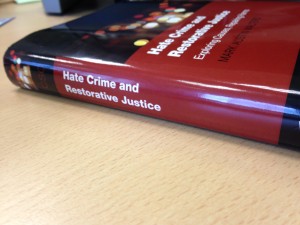
I’ve recently been reading “Hate Crime and Restorative Justice: Exploring Causes, Repairing Harms” by Dr Mark Austin Walters, a lecturer in law at the University of Sussex widely published in the field of hate crime, with a particular focus on the use of restorative justice in hate crime cases. The book comes off the back of an 18-month study examining the use of restorative justice for hate crime in the UK. It explores the consequences and causes of hate crime victimisation and how restorative justice could play a part in repairing the harm caused by hate crimes and challenge the prejudices that lead to this type of abuse. I was encouraged to see a multi-agency approach put across as beneficial to the dialogic processes involved in RJ, as this is an approach that we here at pam are big supporters of!
The book reminded me of something I’d read about a scheme in Bristol last September. The scheme involved bringing together young people aged 16-25 who had acted in a racist/prejudicial manner with their victims to talk about what happened between them and to work out how similar situations can be prevented in the future. As stated at the time by Assistant mayor Councillor Simon Cook, the scheme was one of the first major projects using a restorative approach in the area, and highlighted their commitment to bringing parties together to find resolution. Proven to reduce reoffending by an average of 27%, it is clear that if managed effectively RJ can be a real asset in the attempt to reduce reoffending. It is something that the practitioners we have spoken to are keen to get behind, and something that would benefit greatly from the use of secure collaboration software.
For those of you interested in reading Dr Walters latest book it can be found here, and to learn about how pam could help with restorative justice contact us.
